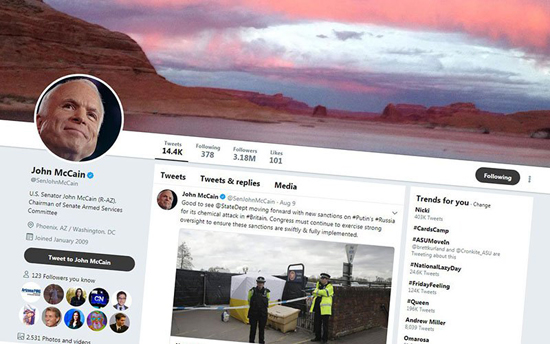By Dani Coble | Cronkite News
When Twitter purged suspicious accounts last month, Arizona Sen. John McCain lost 210,000 followers overnight – but it barely made a dent for McCain, who still had almost 3.2 million followers.
The changes were much the same for the rest of the Arizona delegation, although on a smaller scale, with most lawmakers seeing a drop of less than 1 percent of their followers. And some have rebounded since then, with a few even surpassing their previous totals.
Analysts say that even those lawmakers who lost followers are not likely to see their messaging suffer. As James Garcia put it, the power of the tweet is in the retweet.
“They are more concerned (with) what that message is that they are getting out there, and hoping that it gets repeated again and again and again,” said Garcia, a former political reporter who is now the director of communications and community outreach at the Morrison Institute for Public Policy.
Twitter announced on July 11 that it would be deleting inactive accounts it had previously locked when it “detected sudden changes in account behavior,” and if those account holders had not contacted the company. That initial purge took place between July 12 and 13, although Twitter said the cleansing of accounts will be an ongoing effort from now on.
The average Twitter user was expected to see follower numbers drop slightly after the purge, while those with large social media followings – like celebrities, influencers and politicians – would see the highest impact.

That was true for McCain, who had 3.39 million followers before the purge and 3.18 million after, a little more than 6 percent drop.
Sen. Jeff Flake, R-Arizona, saw his followers drop from 588,000 to 583,000, a drop of less than 1 percent that was typical for most of the rest of the delegation.
Rep. Debbie Lesko’s number of followers was unchanged, while Reps. Andy Biggs, R-Gilbert, and Tom O’Halleran, D-Sedona, bucked the trend, with both men seeing slight increases in their Twitter accounts since the purge. Biggs went from about 11,300 to 11,400 followers and O’Halleran getting 39 new followers to land at 7,085 on July 13.
Since the purge, however, at least three Arizona lawmakers have rebounded from their drops and now have more followers than they did on July 12. As of Aug. 6, Reps. David Schweikert, R-Fountain Hills, Kyrsten Sinema, D-Phoenix, and Paul Gosar, R-Prescott, saw their followers rise to 100 more, 274 more and 793 more, respectively, than they were before purge.
McCain’s office did not respond to a request for comment on the loss of Twitter followers, but Arizona political analysts say it’s not likely to make a difference to him or to any of the incumbents.
“I think for the candidates or office holders themselves, they are more concerned about the tweet, and their staff worry about the followers,” Garcia said.
Political consultant Jason Rose said the culling of dead accounts might actually be a positive for members of Congress because “it takes people out of circulation who weren’t participating in the first place.”
But Rose said that during election season, like the one we’re in now, a candidate’s social media following can be considered an “early and accurate indicator of success or failure.”
“Absolutely, it’s an early indicator of momentum, and electoral success is usually if not always about momentum,” Rose said. “If you see a candidate who’s treading water, in terms of social media following, probably they’re going to finish in the middle of the pack.”
Garcia said “all parties now recognize the power of social media in terms of directly reaching their constituents, their voters.”
But he noted that many of those who follow a candidate are not registered to vote, which takes “themselves out of the equation of having a direct impact on the outcome of an election.”
“In terms of the purging, I think they are more concerned with voter roster purging then they are Twitter purges,” Garcia said.











